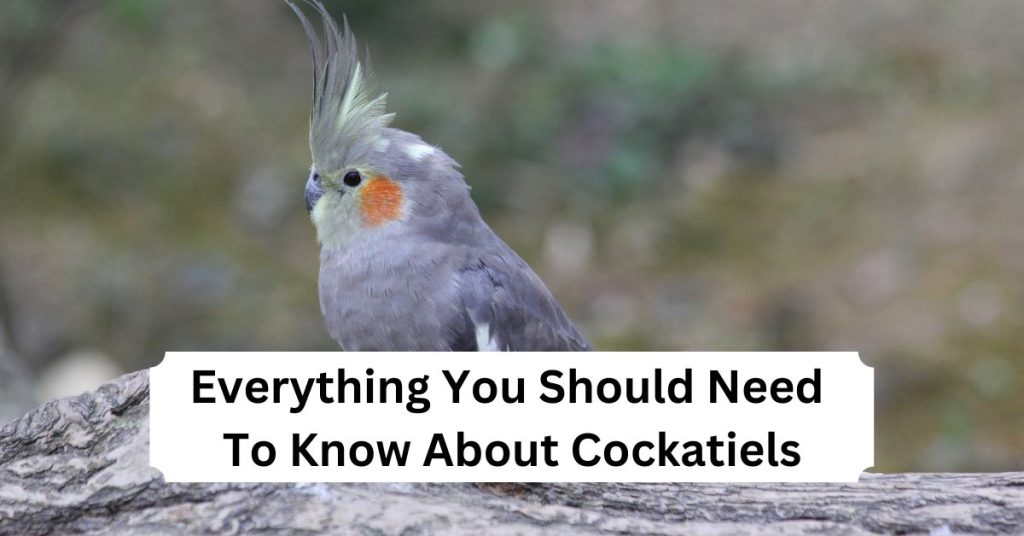What are Cockatiels?
Here are some key characteristics and features of cockatiels:
- Appearance: Adult cockatiels typically measure around 12-14 inches (30-36 cm) in length, including their long tail feathers. They have a gray body with a white or yellow face and a bright orange patch on their cheeks. The crest on their head can be raised or flattened.
- Lifespan: Cockatiels have an average lifespan of 15 to 20 years, although with proper care, they can live even longer.
- Behavior: Cockatiels are known for their playful and social behavior. They enjoy interacting with their owners and can be trained to perform tricks and mimic sounds or words. They are generally gentle birds and can form strong bonds with their human companions.
- Diet: A healthy diet for cockatiels consists of a variety of seeds, pellets, fresh fruits, vegetables, and occasional protein sources like cooked eggs or small amounts of cooked meat. It’s important to provide a balanced diet to meet their nutritional needs.
- Housing: Cockatiels should be provided with a spacious cage that allows them to move around comfortably. The cage should have perches of different sizes and textures, toys for mental stimulation, and separate food and water dishes. They also require regular out-of-cage time for exercise and social interaction.
- Vocalizations: Cockatiels are known for their chirping, whistling, and singing abilities. They can learn to mimic various sounds, including tunes and human speech, although their vocabulary is generally more limited compared to larger parrot species.
- Health care: Regular veterinary check-ups are important to ensure the well-being of cockatiels. They may require periodic beak and nail trimming. A clean environment, a balanced diet, and regular exercise contribute to their overall health.

It’s worth noting that while cockatiels are relatively small and relatively easier to care for compared to larger parrot species, they still require commitment and attention from their owners. Providing a stimulating and nurturing environment is crucial for their physical and emotional well-being.
In which habitat does they live?
Cockatiels are native to the arid regions of Australia, primarily in the inland areas. They inhabit a range of habitats, including open woodlands, scrublands, and savannas. In the wild, they can be found in areas with access to water sources such as rivers, creeks, or waterholes.
Cockatiels are adaptable birds and can survive in different environments, including both coastal and inland regions. They are known to make use of a variety of habitats, from grassy plains to wooded areas with scattered trees. They often prefer areas with access to both open spaces and sheltered spots where they can find food, water, and nesting sites.
These birds are highly social and often found in flocks, which can range in size from a few individuals to large groups. Within their habitat, they are known to forage for food on the ground and in trees, searching for seeds, grasses, fruits, and various plant materials.
It’s important to note that cockatiels kept as pets are not meant to be released into the wild, as they have been bred in captivity for generations and may not have the necessary survival skills or adaptations to thrive in their natural habitat.
How many species of Cockatiel are there?
The wild-type or natural-colored cockatiel has a gray body, a white or yellow face, and an orange cheek patch. Through selective breeding in captivity, various color mutations have been developed, including pied, lutino, cinnamon, pearl, and many more.
These color mutations have become popular among pet cockatiel enthusiasts, resulting in a wide range of visually distinct cockatiel variations. However, these different color morphs all belong to the same species, Nymphicus hollandicus.
How many eggs they give birth at a time?
Female cockatiels typically lay a clutch of eggs during their breeding season. A typical clutch size for cockatiels is between 4 to 6 eggs. However, the number of eggs laid can vary. Some individuals may lay fewer eggs, while others may lay more, with clutch sizes ranging from 2 to 8 eggs being possible.
Cockatiels usually lay their eggs every other day until the entire clutch is complete. After the female has finished laying the eggs, she will begin incubating them. The incubation period for cockatiel eggs is around 18 to 21 days.
Once the chicks hatch, they are altricial, meaning they are born naked, blind, and dependent on their parents for care and feeding. Both the male and female cockatiel participate in incubating the eggs and raising the chicks.
What does they eat?
Cockatiels have a varied diet that consists of both seeds and fresh foods. A balanced diet is essential for their overall health and well-being. Here are some key components of a cockatiel’s diet:
- Seeds and Pellets: A good-quality cockatiel seed mix can serve as the foundation of their diet. It should include a variety of seeds such as millet, canary grass seeds, and smaller amounts of sunflower and safflower seeds. However, seeds alone do not provide all the necessary nutrients, so it’s recommended to supplement their diet with pellets specifically formulated for cockatiels. Pellets offer a more balanced and complete nutritional profile.
- Fresh Fruits and Vegetables: Cockatiels should be offered a variety of fresh fruits and vegetables as part of their diet. This can include leafy greens like spinach and kale, carrots, broccoli, bell peppers, cucumbers, and small amounts of fruits like apples, berries, and melons. These provide essential vitamins, minerals, and fiber.
- Protein: Cockatiels benefit from occasional sources of protein. You can offer them small amounts of cooked eggs (such as hard-boiled eggs) or cooked chicken, both of which should be provided in moderation.
- Treats: Treats should be given sparingly and in small quantities. Cockatiels enjoy occasional treats such as millet sprays, small pieces of whole-grain bread, or unsalted nuts. These treats can be used for training or as occasional rewards.
- Fresh Water: Fresh, clean water should always be available for cockatiels to drink. It’s important to change the water daily to ensure its freshness and cleanliness.
It’s crucial to avoid feeding cockatiels certain foods that can be toxic to them, including chocolate, caffeine, avocados, alcohol, and foods high in salt or sugar. Additionally, always introduce new foods gradually and monitor their response to ensure they tolerate and enjoy the new additions to their diet.
Consulting with a veterinarian experienced in avian care can help you establish a suitable and balanced diet plan for your cockatiel based on their individual needs.
In which country does they are mostly found?
Outside of Australia, cockatiels have gained popularity as pets worldwide. They are commonly kept as pets in many countries, including the United States, Canada, the United Kingdom, Europe, and various parts of Asia. However, it’s important to note that in these regions, cockatiels are not found in the wild but are rather bred and raised in captivity for the pet trade.
How heavy they are?
The weight of a cockatiel can vary depending on factors such as age, sex, genetics, and overall health. On average, adult cockatiels typically weigh between 80 and 120 grams (2.8 to 4.2 ounces). However, individual cockatiels may fall outside of this range.
Male cockatiels are generally slightly heavier than females, but the difference in weight is often minimal. Young cockatiels will weigh less than adult birds, and their weight will increase as they mature.
Monitoring a cockatiel’s weight is important to ensure they maintain a healthy size. Sudden or significant weight loss or gain can be a sign of underlying health issues, so it’s advisable to consult a veterinarian if you notice any drastic changes in your cockatiel’s weight. Regular veterinary check-ups can help monitor their weight and overall well-being.
How long they are?
Cockatiels typically measure around 12 to 14 inches (30 to 36 centimeters) in length from the tip of their beak to the end of their tail feathers. This measurement includes both their body and their tail. The length of a cockatiel can vary slightly depending on factors such as genetics and individual variations, but the average range falls within this size range.
How small they are ?
- Length: Cockatiels typically measure around 12 to 14 inches (30 to 36 centimeters) in length from the tip of their beak to the end of their tail feathers. This measurement includes both their body and their tail.
- Weight: Adult cockatiels generally weigh between 80 and 120 grams (2.8 to 4.2 ounces) on average. However, individual cockatiels can fall outside of this weight range.
In terms of their overall size, cockatiels are smaller than many other parrot species but are still larger than some of the smaller parakeet species. They have a compact and streamlined body shape, making them easy to handle and care for, which contributes to their popularity as pets.
FAQ’s about Cockatiel:
A: Cockatiels have an average lifespan of 15 to 20 years, although with proper care, they can live even longer.
A: Yes, cockatiels make great pets. They are known for their friendly and social nature, their ability to mimic sounds and learn simple tunes, and their playful behavior. They can form strong bonds with their human companions.
A: Cockatiels are capable of learning and mimicking sounds, including words and simple tunes. While they may not have the extensive vocabulary of larger parrot species, they can learn a few words and phrases with training and repetition.
A: Proper care for a pet cockatiel includes providing a spacious cage, a balanced diet of seeds, pellets, fresh fruits, and vegetables, regular out-of-cage time for exercise and social interaction, and periodic veterinary check-ups.
A: Cockatiels are social birds and benefit from companionship. They can form strong bonds with their human caregivers, but they also appreciate the company of other cockatiels. If you cannot spend significant time with your cockatiel, it is recommended to provide them with a same-species companion.
A: Yes, cockatiels are trainable and can learn tricks and simple commands with positive reinforcement training. They are intelligent birds and enjoy mental stimulation.
A: Before getting a pet cockatiel, consider factors such as the time and effort required for their care, the cost of their food, housing, and veterinary care, and the long-term commitment as they can live for many years.
